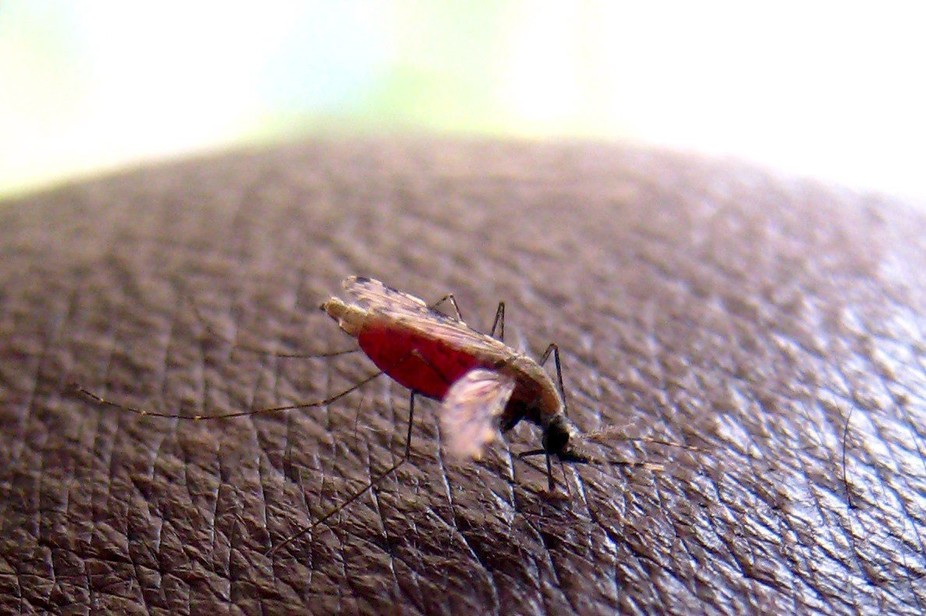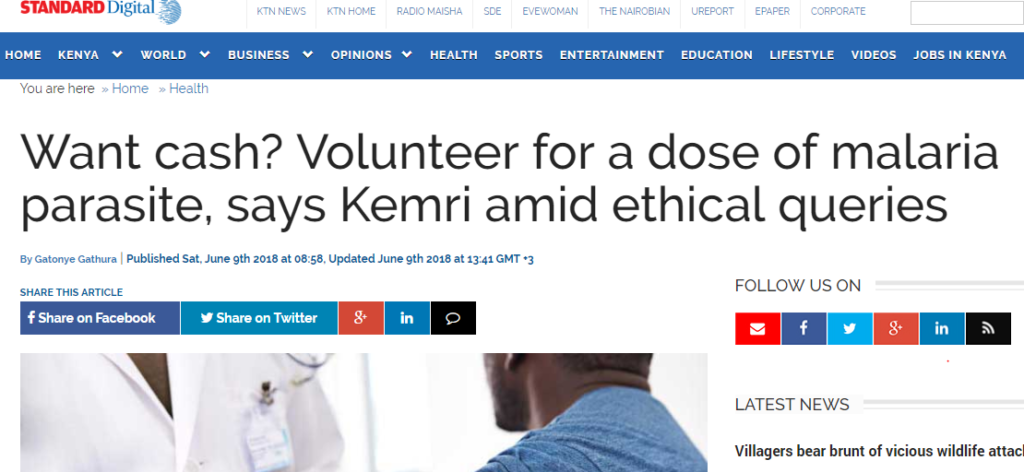
Exciting malaria study
Sensational headlines sell papers, but in the long-run, they create confusion, compounding the growing lack of trust in expert opinion.
Take the headline published on 9th June by the Standard newspapers…
Want cash volunteer for a dose of malaria parasite says kemri
The article gave the impression that people were being coerced, using money, to facilitate participation in a malaria research trial.
KEMRI has released a detailed response to that article …
KEMRI DOES NOT pay volunteers to participate in research activities
https://www.kemri.org/index.php/692-chi-2
If you have any doubts about the research, please read that response from KEMRI.
But I can tell you in a nutshell what this research is about and why you really ought not to be worried at about it.
Why do researchers think this work is important?
Scientists have known that adults living in areas with a lot of malaria very rarely get malaria disease. This is because their bodies have developed an almost solid immunity to malaria. Despite many years of research, scientists have never been able to work out which particular reaction of the immune system to malaria parasites provides adults with this solid immunity.
Scientists believed that the only way to be really sure about what was happening was to conduct very controlled experiments in order to differentiate the highly protective immune response from other ‘noise’ from the immune system.This would work best if adults from areas with different malaria exposures are infected with malaria parasites and the reactions of their immune system monitored closely until full recovery.
For example, if an adult who has spent their whole life in Kisumu is infected with malaria parasites, they will produce an immune reaction that is sufficient to prevent malaria disease.
On the other hand, if an adult who has spent their whole life in, for example, Nairobi, is infected with malaria, their immune system will also react to the malaria parasites. However the adults from Nairobi will be unable to fight the parasites and will most likely get malaria disease.
Comparing the two immune responses from these two groups of adults would enable the scientists to tell apart the highly protective immune response from the adults living in areas where they are always being bitten by malaria infected mosquitoes to those from areas where malaria disease is scarce.
The studies were being conducted in Kilifi, Nairobi, Ahero and Kisumu
Before you scream…..
How dare scientists infect people with malaria!!
STOP
Think for a minute.
How often are you being bitten by malaria infected mosquitoes?
For those in Ahero and Kisumu – that is a daily occurrence.
What is different here is that they were be admitted and therefore under observation for the whole course of the disease. They were discharged once the infection had cleared. Blood samples were collected regularly throughout the admission period and everyone who got sick was treated.
The scientists are all now busy in the laboratory doing the work that may in the long run – hold the key to future malaria vaccine development.
You may be asking – well if it’s so fair and clean – Why are they being paid?
All the study participant are adults – many with families – each day they spend admitted is time lost from looking for work. A mere KSH2,000 (less than 20 US$) a day for compensation for a day of work lost is really very little.
Volunteering for clinical trials and research and getting compensation for it is not new. The respectable Jenner Institute in Oxford University does the same, paying a small fee to volunteers to compensate for their time.
http://www.jenner.ac.uk/recruiting-trials
Many of their volunteers are university students – volunteering to participate in studies developing vaccines and drugs for diseases that they will never come into contact with in their lives.
But they do it because they believe it will make a difference in someone’s life. The money compensates for the time and travel.
So we need to ask ourselves – are we going to support research efforts for vaccines and drugs that affect our own people? I am not saying we throw caution to the wind and show up for any odd trial – you must make sure that the research is solid and relevant. But it is only through research – involving humans – that every single drug – including paracetamol – arrives on the palm of your hand.
This research is in the initial stages, trying to work out what a future malaria vaccine would look like. Once the scientists in the laboratory have worked that out, then they will conduct very many smaller studies to work out the safety and dosage of the vaccines. Then slightly larger trials and the trials grow larger…. Its only when researchers and regulatory bodies like the World Health Organization are convinced that the vaccine is safe and efficacious that it is finally out for public use.
This first step – involving infections – is extremely exciting. Let’s ensure that we get out facts right along the way. A malaria vaccine would save millions of children’s lives. Imagine if these studies conducted by African researchers delivered an effective malaria vaccine?
This is exciting work.
Comment
Comments are closed.




Mary
Learning quite a lot about clinical trials on this blog
Thanks Doc.